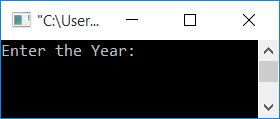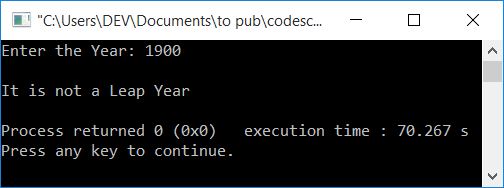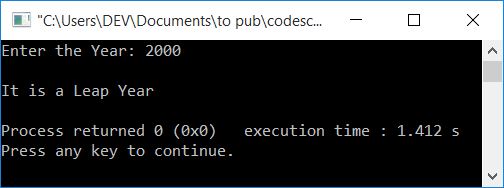- C++ Programming Examples
- C++ Programming Examples
- C++: Hello World
- C++: Get Input
- C++: Print Integer
- C++: Add two numbers
- C++: Add, Sub, Multiply, Div
- C++: Add Digits
- C++: Find Average and Percentage
- C++: Find Arithmetic Mean
- C++: Sum of n Natural Numbers
- C++: Sum of n Numbers
- C++: Square's Area and Perimeter
- C++: Rectangle's Area and Perimeter
- C++: Triangle's Area and Perimeter
- C++: Area and Circumference
- C++: Find Simple Interest
- C++: Fahrenheit to Celsius
- C++: Celsius to Fahrenheit
- C++: Print Prime Numbers
- C++: Reverse a Number
- C++: Swap Two Numbers
- C++: Print Multiplication Table
- C++: Find Factorial of a Number
- C++: Find Factors of a Number
- C++: Find HCF and LCM
- C++: Create a Calculator
- C++: Count Digits in a Number
- C++: First and Last Digit Sum
- C++: Product of Number Digits
- C++: Sum of Squares of Digits
- C++: Interchange Digits of Number
- C++ if-else Programs
- C++: Check Even or Odd
- C++: Check Prime or Not
- C++: Check Alphabet or Not
- C++: Check Vowel or Not
- C++: Check Leap Year or Not
- C++: Check Reverse equals Original
- C++: Check Perfect Number
- C++: Check Palindrome or Not
- C++: Check Armstrong or Not
- C++: Divisibility Test
- C++: Find Labor Wage
- C++: Find Discounted Price
- C++: Find Shipping Charge
- C++: Find Telephone Bills
- C++: Calculate Student Grade
- C++: Largest of Two Numbers
- C++: Largest of Three Numbers
- C++ Number Conversion
- C++: Decimal to Binary
- C++: Decimal to Octal
- C++: Decimal to Hexadecimal
- C++: Binary to Decimal
- C++: Binary to Octal
- C++: Binary to Hexadecimal
- C++: Octal to Decimal
- C++: Octal to Binary
- C++: Octal to Hexadecimal
- C++: Hexadecimal to Decimal
- C++: Hexadecimal to Binary
- C++: Hexadecimal to Octal
- C++ Pattern Programs
- C++: Pattern Programs
- C++: Print Diamond Pattern
- C++: Print Floyd's Triangle
- C++: Print Pascal's Triangle
- C++ Array Programs
- C++: 1D Array Program
- C++: Linear Search
- C++: Binary Search
- C++: Largest Element in an Array
- C++: Smallest Element in an Array
- C++: Find Second Largest Element
- C++: Find Second Smallest Element
- C++: Sum of All Elements
- C++: Multiply All Elements
- C++: Element in Even Position
- C++: Element in Odd Position
- C++: Print Even Numbers in Array
- C++: Print Odd Numbers in Array
- C++: Count Even or Odd Numbers
- C++: Sum of Even or Odd Numbers
- C++: Count Positive, Negative, Zero
- C++: Reverse an Array
- C++: Insert an Element
- C++: Delete an Element
- C++: Merge two Arrays
- C++: Bubble Sort
- C++: Selection Sort
- C++: Insertion Sort
- C++: Common Elements
- C++: 2D Array Programs
- C++: Add Two Matrices
- C++: Subtract Two Matrices
- C++: Transpose Matrix
- C++: Multiply Two Matrices
- C++: 3D Array Programs
- C++ String Programs
- C++: Print String
- C++: Find String Length
- C++: Compare Two Strings
- C++: Copy String
- C++: String Concatenation
- C++: Reverse a String
- C++: Delete Vowels from a String
- C++: Delete a Word from a String
- C++: Count Characters in a String
- C++: Count Words in a String
- C++: Frequency of Words
- C++: Remove Spaces from Strings
- C++: Sort a String
- C++: Uppercase to Lowercase
- C++: Lowercase to Uppercase
- C++: Swap Two Strings
- C++: Check the Anagram or Not
- C++: Capitalize All Words in a String
- C++: Get Numbers from a String
- C++ File Programs
- C++: Read a File
- C++: Write Content to a File
- C++: Append Data to a File
- C++: Read and Display File
- C++: Copy a File
- C++: Merge Two Files
- Count Characters in a File
- C++: Capitalize Every Word
- C++: List Files in Directory
- C++: Delete a File
- C++: Encrypt and Decrypt a File
- C++ Misc Programs
- C++: Print ASCII Value
- C++: Add Binary Numbers
- C++: Generate Random Numbers
- C++: Print a Smiling Face
- C++: Days into Years and Months
- C++: Add Two Numbers using Pointer
- C++: Print Fibonacci Series
- C++: Generate Armstrong Numbers
- C++: Find nCr and nPr
- C++: Get IP Address
- C++: Print Date and Time
- C++: Shutdown and Restart Computer
- C++ Programming Tutorial
- C++ Tutorial
C++ program to check if a given year is a leap year or not
In this article, you will learn and get code for checking whether the given year by the user at run-time is a leap year or not in C++ programming. The leap year program is created using the following three approaches:
- Check for a leap year without using function or class
- Check for a leap year using a function
- Check for a leap year using a class
Before going through the program, if you are not aware of the logic used behind leap year, then I must recommend that you visit Leap Year Logic once. There, you will learn everything about the leap year. But in short, here are the rules to check for the leap year:
- It is a leap year if the year is divisible by 4, but not by 100.
- It is a leap year if the year is divisible by 400.
- And in all other cases, it is not a leap year.
In C++, check the leap year
To check whether the input year is a leap year or not in C++ programming, you have to ask the user to enter the year first and then apply the logic and print the message as shown in the program given below:
So the question is: write a C++ program to determine whether a year is a leap year or not. The answer to this question is given below:
#include<iostream> using namespace std; int main() { int yr; cout<<"Enter the Year: "; cin>>yr; if((yr%4==0) && (yr%100!=0)) cout<<"\nIt is a Leap Year"; else if(yr%400==0) cout<<"\nIt is a Leap Year"; else cout<<"\nIt is not a Leap Year"; cout<<endl; return 0; }
This program was built and runs under the Code::Blocks IDE. Here is its sample run:

Now supply the input, that is, enter any year to print, whether it is a leap year or not, as shown in the output given below with user input as 1900:

Here is another sample run with user input as 2000:

Note: To be a leap year, if a year is divisible by 4, then it must not be divisible by 100.
Leap Year Program Using Functions in C++
This is the end of this article. This program uses the user-defined function checkLeap() to check whether a given year is a leap year or not.
#include<iostream> using namespace std; int checkLeap(int); int main() { int yr, val; cout<<"Enter the Year: "; cin>>yr; val = checkLeap(yr); if(val==1) cout<<"\nIt is a Leap Year"; else cout<<"\nIt is not a Leap Year"; cout<<endl; return 0; } int checkLeap(int yr) { if((yr%4==0) && (yr%100!=0)) return 1; else if(yr%400==0) return 1; else return 0; }
You can also accomplish the same goal in another way, as shown below. Rather than returning the value according to the condition, the function in this program just prints the message directly from inside the function without returning any value.
#include<iostream> using namespace std; void checkLeap(int); int main() { int yr, val; cout<<"Enter the Year: "; cin>>yr; checkLeap(yr); cout<<endl; return 0; } void checkLeap(int yr) { if((yr%4==0) && (yr%100!=0)) cout<<"\nIt is a Leap Year"; else if(yr%400==0) cout<<"\nIt is a Leap Year"; else cout<<"\nIt is not a Leap Year"; }
In C++, check the leap year using Class
Now let's create the same-purpose program using classes and objects.
#include<iostream> using namespace std; class CodesCracker { private: int yr; public: int getData(); void checkLeapYear(int); }; int CodesCracker::getData() { cout<<"Enter the Year: "; cin>>yr; return yr; } void CodesCracker::checkLeapYear(int yr) { if((yr%4==0) && (yr%100!=0)) cout<<"\nIt is a Leap Year"; else if(yr%400==0) cout<<"\nIt is a Leap Year"; else cout<<"\nIt is not a Leap Year"; } int main() { CodesCracker c; int y; y = c.getData(); c.checkLeapYear(y); cout<<endl; return 0; }
This will produce the same output as the first program. Here is a very brief explanation of the above program:
- Inside the main() function, an object c of class CodesCracker is created.
- Using this object, we have called the function getData() of that class and initialized its return value to y.
- That is, inside the getData() function, the value of year gets received (by the user at run-time) and put into yr. And the yr value is returned. Therefore, now the value of yr gets initialized to y inside the main() function.
- Now inside the main() function, we have called the checkLeapYear() function of the same class using its object c.
- We've passed y as its argument. Therefore, in the checkLeapYear() function, with the given value of year (by the user), we've checked and printed the message, whether it is a leap year or not.
The same program in different languages
« Previous Program Next Program »